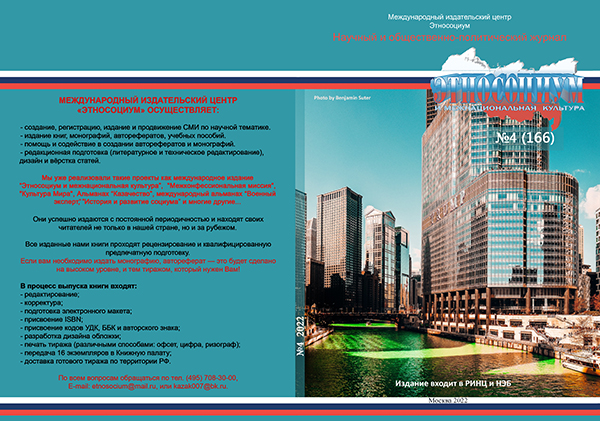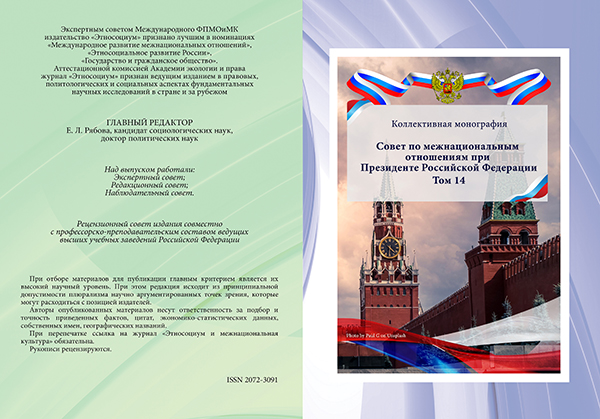

Content
|
COUNCIL OF INTERNATIONAL RELATIONSHIP. DISCUSSION FORUM
|
|
|
Ryabova E.I., Ternovaya L.O. Years of the ridge hump: connecting the axes of history and geopolitics
|
9
|
|
ACTUAL PROBLEMS OF MODERN SOCIETY
|
|
|
Maltsev K.G., Alaverdyan A.L. Republican nation: social community vs political community
|
20
|
|
Storchak V.M., Ogorodnikova O.A., Storchak M.V. The Russian messianic idea in the context of modern problems of historiosophy of the country
|
43
|
|
Grishin O.E., Chistov I.S., Kolpakov M.V. Politics - XXI century: a new look at the problems of war and peace
|
52
|
|
REGIONAL STUDY
|
|
|
Makhmudov A.S. Political regionalism and its place in the system of political science knowledge
|
63
|
|
Trofimov V.A. Political-geographical realities of the Sakhalin region
|
73
|
|
INTERNATIONAL RELATIONSHIPS
|
|
|
Gao Chunyu, Gao Yan The formation of the concept of Marxism in China
|
83
|
|
Sui Tao Sino-Indian relations in the context of the Indo-Pacific strategy
|
94
|
|
Abstracts
|
101
|
|
Authors
|
109
|
|
Requirements to materials submitted to the international publishing house "Etnosocium"
|
111
|
The concept of "axis of history" arose at an early stage in the development of geopolitics, combining ideas about time and space, in which axial characteristics were associated with real geographical objects. For the Eurasian space, the Ural Range acted as such an axial model. This mountain range separating Asia and Europe is associated with numerous geocultural images that can serve to decipher complex geopolitical constructions.
Keywords: history, geopolitics, geography, axis, ridge, Eurasianism.
The aim of the study is to interpret the liberal political project of the «republican nation» in the perspective of the main directions of the explanation of «nation» and «national» in modern social science. The contrast between the representation of the nation as a «social group» and as a «political community» is revealed, which is removed in the liberal representation of the social and political. The «Republican nation» is constructed normatively in the horizon of the fundamentals: the unconditional removal of «ethnicity» as «natural» or «historical» cash; as a civil association, that is, the result of self-determination of an autonomous subject; a principled attitude to consider the subject as an «indecomposable locus of sociality», that is, individualism; representations of «cosmological values» (culture, religion) as politically irrelevant «features»; based on civic loyalty to the liberal political order. The conclusion is made: the political project of the republican nation is one of the technologies of global governance.
Keywords: republican nation, ethnicity, social group, civic association, political, primordialist and situationist explanation of the nation.
This article deals with the issues of adaptation of past Russian ideologies for the modern information realities of Russia. The concept of "Moscow – the Third Rome" contributed to the development in the domestic philosophical and socio-political thought of such ideologemes as a special, civilizational path of Russia, the ideas of Pan-Slavism and the specific moral character of the Russian people, etc.
Keywords: messianism, Moscow - the Third Rome, pan-Slavism, ideology, Russia.
The article discusses new approaches to the perception of war and peace in the public consciousness. The principles of public consciousness development in such conditions are highlighted. It is shown that information warfare has become one of the main military strategies of world states. Attention is focused on the fact that modern politicians influence the formation of public opinion, primarily through the mass media. The authors complement the research approaches to this problem.
Keywords: war, peace, conflicts, 21st century, information war, propaganda, media, Ukraine, Russia, globalization.
The article analyzes the essence of political regional studies, considers its place in the system of political science knowledge. The features of political regional studies as an independent branch of scientific research, its differences from other branches of political science, in particular from regional political science, are shown. The fundamental differences between political regionalism and the “area studies” common in the West are emphasized. The main stages in the formation of regional political studies in Russia at the end of the 20th - beginning of the 21st century are outlined. The basic terminology of political regional studies is revealed, a number of aspects related to its subject field are touched upon.
Keywords: political regional studies, system of political science knowledge, regional political science, “area studies”, political regions, administrative units, subjects of the Russian Federation.
The article deals with the regional and political features of the Sakhalin region. Special emphasis is placed on the spatial-geographical and natural-climatic factors that determine the political specifics of Sakhalin and the Kuril Islands. The historical circumstances in which the formation of the Sakhalin region as a spatial and territorial phenomenon took place are shown. Some issues related to the relationship along the axis "Federal Center – Sakhalin Region" are highlighted. Problems of a demographic nature are touched upon, and the approaches of regional authorities to their solution are outlined.
Keywords: regional policy, Sakhalin Region, Sakhalin Island, Kuril Islands, federal center, defense security strategy, demographic problems.
This article examines the problem of Marxist propaganda in China from 1918 to 1924, around the time of the establishment of the CCP. The paper deals with the issue that in China Marxist propaganda activities were carried out not only by people from Soviet Russia and the Comintern, but also by some Russian emigrants, who, although not Communists, professed and disseminated Marxism. The propaganda activities of Soviet Russia, the Comintern, and Russian émigrés are analyzed. They all wrote propaganda articles and provided Marxist-Leninist literature and propaganda materials about the revolution and the construction of Soviet Russia; conducted propaganda through conversations, talks, discussions, lectures and speeches or reports; actively assisted the Chinese Communist Party in creating propaganda tools. It is argued that these propaganda activities contributed greatly to the integration of Marxist propaganda with the Chinese labor movement, strengthened the class strength of Marxist propaganda in China, and promoted the establishment and growth of Communist organizations in China. The novelty of the study is that the paper comments on the Marxist propaganda activities of Russian émigrés who were not communists. The article uses methods of historical research, comparison, contrast, abstraction and idealization. The research is based on the principles of historicism, critical approach to the sources used, and comprehensive analysis of the problem.
Keywords: Marxism, propaganda, China.
In recent years, relations between China and India have become complicated due to their own structural contradictions and the influence of the US implementation of the Indo-Pacific strategy. This article attempts to demonstrate the reasons for this situation from two sides: internal and external. The US has not yet announced its position on the Indo-Pacific region, but the overall scheme sees China as the main threat to US political, economic and military influence in the region. Therefore, the leaders of China and India must independently manage their differences without the participation of the United States in order to maintain peace in the region. China and India must move peacefully and cooperate with each other without losing political sovereignty or becoming instruments of Washington's foreign policy.
Keywords: Sino-Indian relations, Indo-Pacific strategy, USA, international relations, intercultural dialogue.